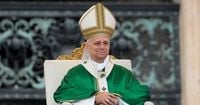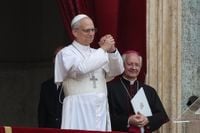On Sunday, October 5, 2025, St. Peter’s Square in Rome was awash with sunlight and anticipation as Pope Leo XIV presided over a special Mass marking the Jubilee of Missions and of Migrants. The event, attended by tens of thousands of migrants and missionaries from around the world, became far more than a liturgical celebration—it was a clarion call for a new way of living faith in a world increasingly shaped by migration and displacement.
From the outset, Pope Leo XIV’s homily set an unmistakable tone. "Brothers and sisters, today a new missionary age opens up in the history of the Church," he declared, according to Catholic News Service. His words echoed across the vast square, but their resonance was meant for every Catholic, no matter where they lived. The Pope, drawing on decades of missionary work in Peru and his own experience managing the migration crisis during Venezuela’s mass exodus in 2018, made it clear: the essence of being a missionary had changed.
“The frontiers of the missions are no longer geographical, because poverty, suffering and the desire for a greater hope have made their way to us,” Pope Leo said, as reported by OSV News. He recounted the “tragedy of their flight from violence, the suffering which accompanies it, the fear of not succeeding, the perilous risk of traveling along the coastline, their cry of sorrow and desperation.”
He painted a vivid picture: “Those boats which hope to catch sight of a safe port, and those eyes filled with anguish and hope seeking to reach the shore, cannot and must not find the coldness of indifference or the stigma of discrimination!” The message was not just pastoral; it was urgent and, at moments, confrontational. Leo XIV’s address reframed the immigration debate as a test of faith, not a matter of politics or policy.
In the days leading up to the Mass, the Pope had already made headlines for his pointed critique of U.S. President Donald Trump’s immigration enforcement measures. According to CNS, Pope Leo had remarked, “Someone who says that I am against abortion, but I am in agreement with the inhuman treatment of immigrants who are in the United States, I don’t know if that’s pro-life.” The statement, delivered to reporters, was widely interpreted as a challenge to conservative Catholics who support hardline immigration policies while championing other aspects of Catholic social teaching.
During the Mass itself, Leo XIV doubled down on this theme, urging Catholics everywhere to move beyond apathy and to see migrants not as statistics or threats, but as fellow human beings deserving dignity and welcome. “No one should be forced to flee, nor exploited or mistreated because of their situation as foreigners or people in need! Human dignity must always come first,” he said during the recitation of the Angelus, as reported by CNS.
The Pope’s vision of mission was radical in its simplicity: “Mission is not so much about ‘departing,’ but instead ‘remaining’ in order to proclaim Christ through hospitality and welcome, compassion and solidarity.” He called for Christians to resist the temptation to retreat into comfort and individualism, and instead “open our arms and hearts to them, welcoming them as brothers and sisters, and being for them a presence of consolation and hope.”
This approach was not merely theoretical. Pope Leo XIV praised the “many missionary men and women, but also believers and people of good will, who work in the service of migrants, and promote a new culture of fraternity on the theme of migration, beyond stereotypes and prejudices.” But he insisted that the work cannot be left solely to professionals or volunteers: “This precious service involves each one of us, within the limits of our own means.”
According to The Tablet, Leo XIV’s remarks represented a strategic reframing of migration as an opportunity for the Church, not a crisis. He urged Western Catholic communities—especially those with ancient Christian traditions—to welcome migrants from Africa, Latin America, and Asia as “an opportunity, through an exchange that renews the face of the Church and sustains a Christianity that is more open, more alive and more dynamic.” In a world where church attendance is declining in Europe, the Pope sees migrants as bearers of faith and vitality, capable of revitalizing stagnant congregations.
He also addressed those called to missionary service abroad, urging them “to live with respect within the culture they encounter, directing to the good all that is found true and worthy, and bringing there the prophetic message of the Gospel.” The Pope’s call for “missionary cooperation” was clear: the Church must both send and receive, learning from the faith of migrants while sharing its own traditions in a spirit of mutual respect.
The timing of Leo XIV’s address was deliberate, coming during a special convocation that drew over 10,000 pilgrims from approximately 95 countries. Vatican officials, as reported by The Tablet, indicated that migration advocacy would remain central to the Pope’s agenda throughout the ongoing holy year. The gathering’s diversity underscored Catholicism’s global reach and the urgent need for a unified, compassionate response to displacement and migration.
Yet, the Pope’s message was not without controversy. His earlier critique of U.S. immigration policy drew swift condemnation from conservative Catholic commentators who accused him of overstepping his spiritual authority. Still, Leo XIV refrained from naming specific nations in his homily, opting for a broader indictment of global attitudes toward migration. This allowed his message to resonate beyond American politics, while maintaining plausible deniability about targeting any particular administration.
What was unmistakable, however, was the Pope’s insistence that the treatment of migrants is a defining moral question for this era. “Each one of us should be able to say with joy: the entire Church is missionary, and it is urgent…that we ‘go forth and preach the Gospel to all: to all places, on all occasions, without hesitation, reluctance or fear,’” he said, quoting Pope Francis’s Evangelii Gaudium.
To migrants themselves, Leo XIV offered a message of hope and assurance: “Know that you are always welcome! The seas and deserts that you have crossed, Scripture calls ‘places of salvation’, in which God makes himself present to save his people. I hope that you find this face of God in the missionaries that you encounter.”
As the holy year continues, the Pope’s words hang in the air—a challenge to Catholics everywhere. Whether communities will heed his call, moving beyond security concerns and cultural anxieties to embrace a gospel of radical hospitality, remains to be seen. But for now, Leo XIV has made the stakes clear: the Church’s future, and perhaps its very soul, will be measured by how it welcomes the stranger.


